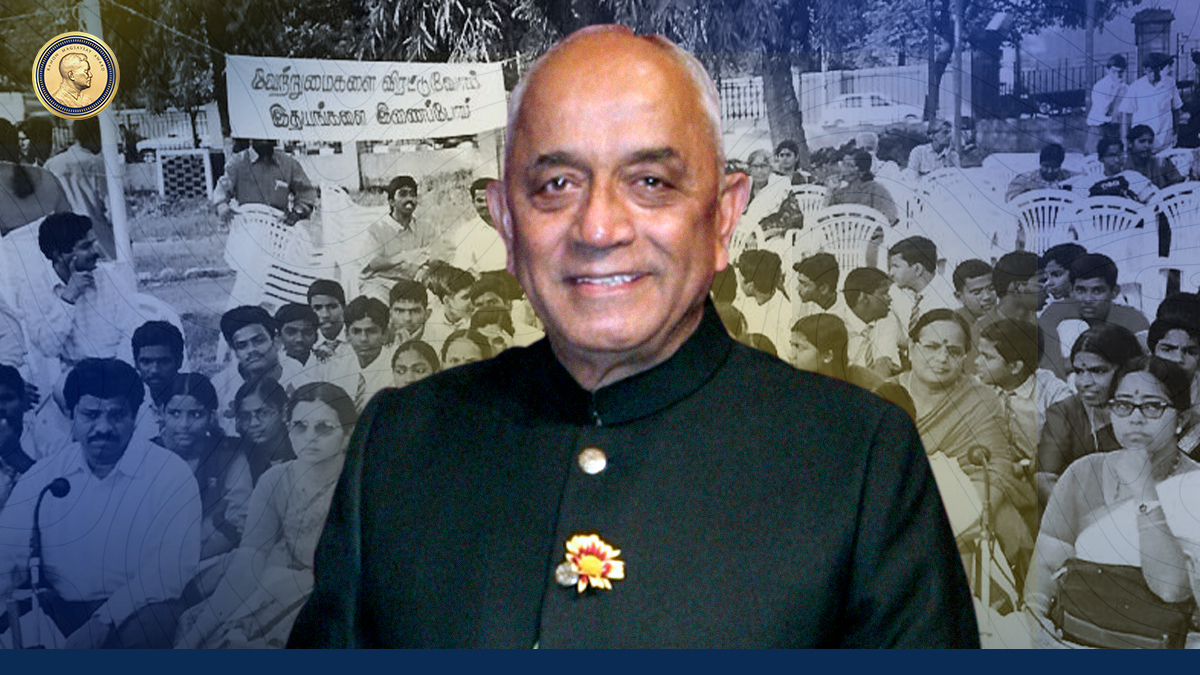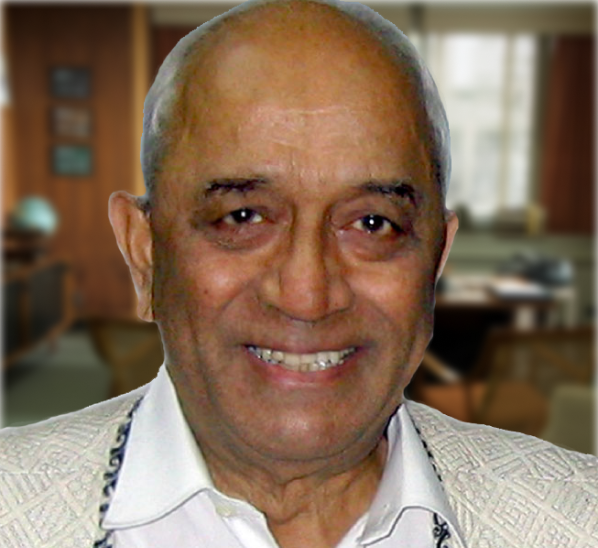- LAXMINARAYAN RAMDAS, a Hindu from Mumbai, became a cadet at India’s Armed Forces Academy in Dehradun and, later, the Royal Naval College in Dartmouth, England; rose to become chief of India’s navy, retired and acquired a Pakistani son-in-law. As tensions again rose between India and Pakistan, he sought to influence India to change course.
- In September 1994, RAMDAS joined twenty-four like-minded Indians and Pakistanis in Lahore to open a public dialogue for reconciliation and peace which led to the formation of the Pakistan-India Peoples’ Forum for Peace and Democracy.
- Ramdas says that India’s explosion of a test atomic bomb in May 1998 “was one of the greatest turning points in my life.” In July, he signed a public declaration by retired military men declaring that “nuclear weapons should be banished from the South Asian region, and indeed from the entire globe.”
- The RMAF board of trustees recognizes them for reaching across a hostile border to nurture a citizen-based consensus for peace between Pakistan and India.
The armed standoff between India and Pakistan has endured for more than fifty years, bringing with it four outright wars and continuing upheaval. Its flashpoint is Kashmir, claimed by both sides, but its roots lie in the shocking communal violence of Partition in 1947. In the years since then, memories of this disturbing event have fueled religion-infused nationalism and militarism in both countries and kept millions of fearful people poised for war. Today, both sides boast nuclear weapons and the stakes are global. The problem seems intractable. But IBN ABDUR REHMAN of Pakistan and LAXMINARAYAN RAMDAS of India believe there is hope. As leaders of the Pakistan-India Peoples’ Forum for Peace and Democracy, they are building popular support for peace on both sides of the border.
ABDUR REHMAN, a Punjabi Muslim born in 1930, was away at Aligarh University in 1947 when Partition violence erupted in his hometown and several members of his family were killed by rampaging communalists. LAXMINARAYAN RAMDAS, a Hindu from Mumbai, was fourteen at the time and living in Delhi. He remembers angry mobs threatening his parents for protecting a Muslim family. REHMAN was obliged to migrate to Pakistan with his father. In Lahore, he found his vocation in journalism, rising from post to post at leading Pakistani publications to become chief editor of the Pakistan Times in 1989. RAMDAS became a cadet at India’s Armed Forces Academy in Dehradun and, later, the Royal Naval College in Dartmouth, England. He rose from command to command until, in 1990, he was named chief of India’s navy.
By 1993, REHMAN had left The Times, under pressure for criticizing the government, and Ramdas had retired and acquired a Pakistani son-in-law. As tensions again rose between India and Pakistan, both men sought to influence their countries to change course. In September 1994, REHMAN joined twenty-four like-minded Indians and Pakistanis in Lahore to open a public dialogue for reconciliation and peace. This led to the formation of the Pakistan-India Peoples’ Forum for Peace and Democracy. REHMAN became founding chair of the Pakistan branch; RAMDAS was named vice-chair of the India branch and became chair in 1996. Both men guided the organization until 2003.
The Forum’s chief weapon was dialogue. In a series of conventions beginning in 1995, it drew hundreds of Indians and Pakistanis together to promote demilitarization, denuclearization, and peace and to publish resolutions insisting upon mutual arms reductions and troop pullbacks; an end to cross-border provocations; and a “peaceful, democratic solution” in Kashmir. Meeting alternately in Pakistan and India, the conventions sustained this dialogue for ten years and more as the Forum’s base grew to embrace a web of environmental, human rights, trade union, and women’s rights activists as well as concerned citizens from the academe, industry, and the professions.
During the same years, the Forum organized people-to-people delegations of lawmakers, diplomats, soldiers, artists, and students to open friendly talk channels between Indians and Pakistanis and to counteract propaganda in each country stigmatizing the other. And it campaigned for the liberalization of travel between the two countries and for the revision of hate-filled school textbooks. At another level, Forum leaders such as REHMAN and Ramdas worked behind the scenes with national leaders and opinion makers to promote the peace agenda. The Forum’s mission is not grandiose. “It is enough,” REHMAN says, “to contribute in easing the tension between the two countries by providing opportunities for people to meet.”
For REHMAN, the Forum’s peace initiative grew naturally from his work as one of Pakistan’s leading human rights advocates and as longtime director of the internationally esteemed Pakistan Human Rights Commission. In this role and also as a journalist, REHMAN has devoted decades to exposing systemic violations of the rights of women, children, workers, and minorities in Pakistan and to fighting corruption and the abuse of power. He has been a champion of democracy as a secular ideal in a country where, he says, “authoritarianism has been the rule and short-lived democratic facades an exception.” All this at considerable personal risk and sacrifice. As for India and Pakistan, he calls upon both countries to reject their “pathological obsession with the politics of hostility.”
RAMDAS says, “I entered the armed services as a hawk and exited as a dove.” His military career made him intimately familiar with the limitations of military solutions to political problems. This led to his role in the Forum. Still, India’s explosion of a test atomic bomb in May 1998, RAMDAS says, “was one of the greatest turning points in my life.” In July, he signed a public declaration by retired military men declaring that “nuclear weapons should be banished from the South Asian region, and indeed from the entire globe.” With his wife, Lalita, he threw himself into the antinuclear cause, warning Indians and Pakistanis alike about their country’s unreliable “control and command systems” and about the naivete of nuclear deterrence.” Touring and speaking extensively, he exhorted everyone to guard against the seductiveness of solutions “through super-violence.”
RAMDAS and REHMAN both connect the problem of peace in the subcontinent to dangerous ideologies that associate religion with nationalism and patriotism, and to militarism and other antidemocratic forces. REHMAN rues his own country’s “absence of genuinely democratic institutions.” And RAMDAS has linked recent political trends in India to “the path to fascism.” Both have been smeared as traitors, but they are not moved. It is time to stop the belligerent shouting and listen to other voices, they say. When it comes to war and peace, REHMAN likes to say, “I believe the people are a little ahead of the governments.”
In electing IBN ABDUR REHMAN and LAXMINARAYAN RAMDAS to receive the 2004 Ramon Magsaysay Award for Peace and International Understanding, the board of trustees recognizes their reaching across a hostile border to nurture a citizen-based consensus for peace between Pakistan and India.
Chairman and Trustees of the Ramon Magsaysay Award Foundation, Distinguished Guests, Fellow Awardees and members of the fourth estate, friends all over the world, especially in India and Pakistan and here in the Philippines.
The Ramon Magsaysay Award Foundation has done me a great honour by conferring this award on me for Peace and International Understanding this year.
I am very happy to share this award with my friend I.A. Rehman from Pakistan for it puts people of our two countries before anything else in the best traditions of peace and democracy. I am also grateful to the Foundation for recognizing the work that I have been doing in the larger global context on issues concerning nuclear weapons and nuclear disarmament. I must be the first one to acknowledge here in public that but for my wife, Lalita’s contribution and support much of all this would not have been possible. Coming from a minority of one in a family of four women I had very little choice but to be democratic and listen!
We have seen for far too long the Jammu and Kashmir issue, as an argument about which government will assert sovereignty. But if governments are to be in the service of people, if armed forces are to be in the service of peace, then the rights of the people must come first. Millions of families are divided across the border that was created by making freedom in South Asia among the more bloody chapters in the history of struggle against colonialism. The tragedy and the tears cannot be undone, but it is a moral imperative that people be allowed to move across borders without fear, so that they can pursue normal lives?celebrate births and weddings and mourn the deaths of dear ones in dignity and peace.
We have over the past ten years tried in our own small way to make the people in both our countries aware of the enormous challenges and opportunities that face us. Peace is what the people want for they are very clear what the peace dividend has in store for them and their children. The Treaty of Westphalia 1648, which created the concept of the Nation State, has in its wake sharpened the prejudices which were built in at the time of partition of the country. The acquisition of nuclear weapons by both India and Pakistan has further endangered the security environment of the region. We can alter history, alter people’s minds, sow seeds of hatred but cannot erase the oneness of humanity. Humanity above Nationality should dominate modern thinking for this cuts across borders, race, color, caste, creed and gender. The role of the military must also not remain static. It must trim its sails in keeping with the times. Your President Mme. Arroyo’s own courageous decision to pull back your troops from Iraq has been acclaimed the world over. Whilst this might have made her unpopular with a few it has gained her many friends and admirers including myself.
This beautiful planet of ours is but a mere speck in this universe. In the ancient Indian scripture, Vedas, we have a saying, “Vasudeva Kuttumbakkam” which means, “The world is one family” — We need to keep it that way.
I wish to conclude by once again thanking the government, the Ramon Magsaysay Award Foundation and the beautiful people of Philippines for their warmth and hospitality that they have shown us during our stay here. Salamat and Namaste.
Related Articles


